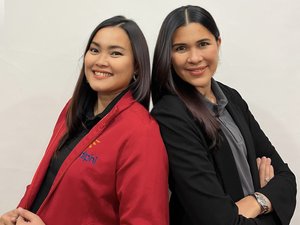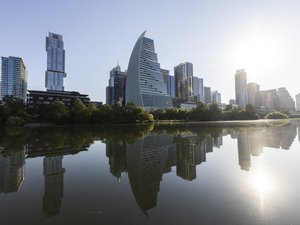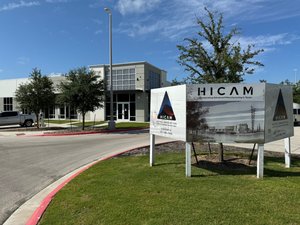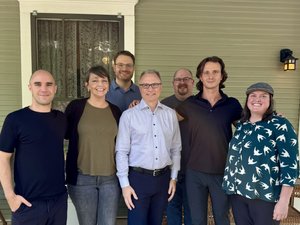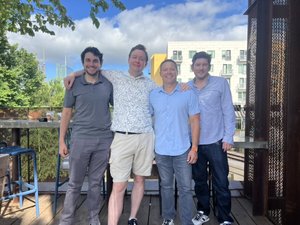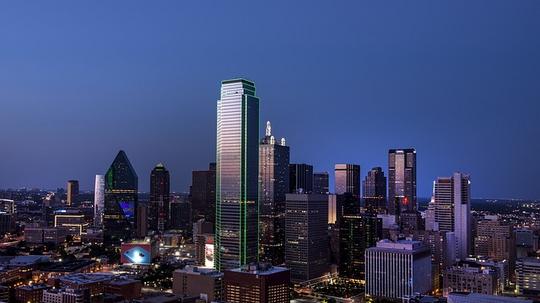
By Steve Guengerich
I arrived in Dallas a little more than six months ago, April 1, to begin my new role at the University of Texas at Dallas. At UT Dallas, as we call it for short, I’m a clinical associate professor in the School of Management, where I teach entrepreneurship. The program, overall, is a top 25-ranked entrepreneurship program in the country, right up there with our UT Austin and Texas A&M brethren.
I’m also executive director of the Institute for Innovation and Entrepreneurship. The Institute includes a co-working space and accelerator (the Blackstone LaunchPad at UT Dallas), an incubator, a training group, a seed fund, and much more – all working together under the unifying, umbrella theme of “entrepreneurship.” For more, you can take this 3-minute video tour.
Dallas 30,000 Feet
Rather than talking about UT Dallas, I wanted to share some initial observations about the Dallas startup scene, for the ATX’rs back home. Clearly, what I’ll describe is part reportage, with an even larger part, anecdotal op-ed generalizations, from what I’ve seen and heard. Nonetheless, I hope some find it helpful, to get a running start with getting integrated into the DFW scene.
While I’ve day-commuted to Dallas to do business for more than 30 years, I’ve never lived here. Before I made the move, like many of my Austin colleagues and friends, I had developed a high-level impression of the city. I would venture to say it is shared by other non-Dallas-ites, as a city whose residents consider themselves more cosmopolitan, a bit more reserved, and a cut above the rest of the Texas social scene, more in the national league of NY, LA, or Chicago.
As an ATX’r, it’s interesting to see the ways this seems to manifest itself on the ground. For example, in Dallas the saying is that people tend to “wear or drive” their wealth, but they don’t talk about it – at least not in public.
Whereas in Austin, the tech multi-millionaire and the struggling indie musician could be standing in line together at Torchy’s, if you didn’t know better. But, the wealth symbols among the ATX tech crowd is the currency of “hottest” deal affiliation, as gauged by: who was on the founding team of which post-Trilogy or -Tivoli hit? Who was an original developer on which award-winning product? Who funded what deal acquired by Google or Under Armour, etc.?
The Investors
Speaking of, let’s talk about venture deals, starting with VCs and other risk capital providers. To start with the amount of risk capital - including angel, institutional VC, and other private equity - deployed towards startups was actually greater in Dallas than Austin, as of Q1 2017, with $6.97 billion v. just under $6 billion, respectively.
In the early days of the current internet age, the center of Dallas venture capital was the Galleria area. Specifically, the 16th floor of Galleria Two, anchored by Sevin Rosen, famous for Compaq. (Jackie Kimzey, one of the early Sevin Rosen general partners, is a fellow professor on the faculty of UT Dallas with me.)
However, the dot-bomb bust and subsequent Great Recession decimated those firms and confidence in the tech sector. Unlike Austin, where the diaspora of Austin Ventures has resulted in a handful of smaller, but active & growing VCs, Dallas hasn’t quite recovered from that 1-2 punch.
And, there have been active angel networks, including the North Texas Angel Network, or NTAN, Cowtown Angels, aka, the Ft. Worth angel network , and the more informal Dallas Angel Network, organized by Dallas startup consigliere, Kevin Vela, founding partner of Vela Wood.
But the real story of Dallas risk capital is the enormous amount of private wealth, managed by family offices. The large majority of this wealth is a result of oil & gas, real estate, and, to a lesser extent, communications, retail, and various hospitality businesses (food & beverage, hospitality, etc.).
By way of example, Tolleson Wealth Management, is a multi-family office operation that manages the affairs of more that 150 high net wealth families. And, there are many more like them. You can find a number of second and third generation family members involved in the Tiger 21 organization in Dallas.
So large is the amount of private wealth in Dallas, that Trey Bowles, CEO of the Dallas Entrepreneur Center, says the amount of risk capital put to work in Dallas tech startups and other new ventures over the past year is approx. $1 billion, unfortunately that amount isn’t fully reported by the “classic VC” industry watchers like the NVCA, when comparing Austin to Dallas, making Dallas appear to be a weaker capital market when compared to Austin.
And, finally, it’s worth mentioning that large corporate headquarters and multi-building campus enterprises cast large shadows on the startup scene in DFW. Exxon Mobil, AT&T, Southwest and American Airlines, and Kimberly Clark make up the nearly two-dozen Fortune 500 company HQs calling the DFW area home.
The attention that they and other large corporate relocations get (e.g., divisions of Capital One, State Farm, Goldman Sachs, etc.), further serves to prevent promising early-stage firms and scrappy boot-strapped ventures from getting the full love and attention they may deserve. However, on the positive side, they bring with them: deep corporate pockets for early-stage products; a large pool of skilled, mid-level, technology-savvy workers, many who eventually take the startup plunge; and, satellite operations of corporate venture funds (like those of Toyota and AT&T) trolling for ideas and supporting the ecosystem.
The Accelerators
This misperception about the amount of startup funding, fueled by differences in regional-city culture and history, has created a perplexing challenge for Dallas, when it comes to attracting and encouraging a thriving, home-grown startup scene. Whereas in Austin, there is an embarrassment of riches in learning and officing resources for startups – incubators, accelerators, studios, and co-working spaces – Dallas has far fewer resources.
The best known of these are the non-profit/public partnership resources, the Dallas Entrepreneur Center (“the DEC” as it’s universally known), led by Trey Bowles, and Tech Ft. Worth, led by Darlene Boudreaux. The DEC has its central location in downtown Dallas’s market area, for which it is best known, as well as locations north (the “Addison Treehouse”) and south of the city.
On the commercial side there are a handful of for-profit programs and co-working spaces, including REVTECH Accelerator, led by David Matthews, Health Wildcatters, led by Hubert Zajiceck, and Tech Wildcatters, led by Gabriella (Gabe) Zielke.
Along with these groups, there are a handful of hybrid accelerator/studio models, including Collide Village’s recently announced Co-Build, led by Tahir Hussain, and Code Authority’s CodeLaunch seed accelerator, anchored by its popular, competitive pitch program.
On the university front, the DFW area has strong portfolio of higher education resources aimed at entrepreneurship. These include UT Dallas, led by yours truly, the UT Southwestern Medical Center, and UT Arlington.
In addition to this strong University of Texas system presence, private universities – Southern Methodist’s Caruth Center, led by Jerry White, and Texas Christian’s Venture Program, led by Matt Smilor – provide further resources and richness to the DFW entrepreneurial ecosystem.
The Startups
Of course, all of these resources – the money, facilities, and learning programs – wouldn’t exist if meaningful companies hadn’t first generated the wealth and inspiration for them. Nor, would they continue to be available, if those companies’ founders hadn’t re-invested in new generations of startups and encouraged civic and industry leaders to do the same, today.
Among great startup stories in the Dallas area - although many left the “startup” label behind long ago - noteworthy ones include: Texas Instruments (or TI, founded by McDermott, Jonsson, Green), Electronic Data Systems (or EDS, founded by Perot, Myerson, et al), and Broadcast.com (founded by Mark Cuban and Todd Wagner). Softlayer (founder Lance Crosby has been dubbed “founder of the cloud”), Transfirst (acquired by Visa for $1.5b), Affiliated Computer Services (founded by Doug Deason and acquired for $6.4b), and Massergy Communications (Chris McFarland).
In more recent years, the number of Dallas-area unicorns (and semi-unicorns) in the tech space can be counted on fingers and toes. But, they do exist.
For example, there is Hotels.com, sold to Expedia in a deal presaging the acquisition path similarly taken by Austin’s Homeaway. “Hotels” was founded in the 1990s by David Litman and Bob Diener, who are in the process of working for a second strike of lightning, with their GetARoom startup.
And, perhaps that’s the best way to end this introduction, with the yin/yang of any Austin/Dallas comparison – or, for that matter, any Austin/“city x” comparison. Because, on the one hand, the typical ATX’r would struggle to imagine themselves living, much less thriving, in a startup environment whose latest mega-deal was led by a 68-year old first-time founder, in the eye care industry, funded by an angel group proudly named after the era of cattle drives and the Wild West.
Yet, on the other hand, whether t-shirt- & sandals-wearing Austin-ite or Rolex- & Prada-wearing Dallas-ite, there is the yang of a deep affinity for the next, great startup venture, with its potential to make an outsize impact – on its industry and people’s lives – and generate a bit of wealth, along the way. That’s something with which all Texas entrepreneurs can agree.
Editor's Note: An earlier version of this story listed Stack Overflow as a Dallas company. Its headquarters is in New York.
